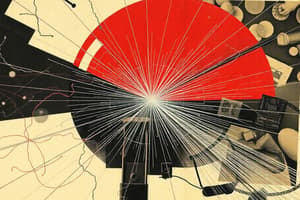Podcast
Questions and Answers
What is the branch of classical mechanics that describes the behavior of electrically charged particles?
What is the branch of classical mechanics that describes the behavior of electrically charged particles?
- Quantum Mechanics
- Electromagnetism (correct)
- Astrophysics
- Thermodynamics
What do electric charges carry?
What do electric charges carry?
- Negative or positive electrical charge (correct)
- Neutral charge
- Magnetic charge
- Fractional charge
What generates magnetic fields according to the text?
What generates magnetic fields according to the text?
- Static charges
- Light waves
- Flowing electric charges (correct)
- Sound waves
What are the interactions among electric charges produced by motion and magnetic moments known as?
What are the interactions among electric charges produced by motion and magnetic moments known as?
How are electric charges quantized?
How are electric charges quantized?
Why do magnets produce magnetic fields according to the text?
Why do magnets produce magnetic fields according to the text?
Flashcards are hidden until you start studying
Study Notes
Electromagnetism in Physics
Electromagnetism is a branch of classical mechanics that describes the behavior of electrically charged particles. It deals with interactions among electric charges produced by motion and magnetic moments resulting from intrinsic angular momentum, known as spin, of elementary particles. These phenomena occur together throughout nature and play crucial roles in determining the dynamics of atoms, molecules, and macroscopic systems.
Electric Charges
Electric charges carry negative or positive electrical charge. They can attract or repel each other depending on whether they have opposite or similar signs, respectively. This attraction and repulsion form electrostatic forces, which exert mechanical actions on bodies carrying charges. Electric charges are quantized, meaning they exist in discrete amounts called elementary charges; protons and neutrons possess a unit charge while electrons bear a fractional charge.
Magnetic Fields
Magnetic fields are generated by flowing electric charges, by electric currents in particular. They surround any conductor through which a steady current flows and extend outward from a source of changing magnetic moment. Magnets produce magnetic fields since they have unbalanced electron distributions. Magnetic monopoles—individual north or south poles unattached to magnets—have yet to be discovered experimentally.
Studying That Suits You
Use AI to generate personalized quizzes and flashcards to suit your learning preferences.




